
I woke up one Thursday at 5:30 in the morning. I dragged myself out of bed, barely able to get ready for zero band. That day, by 7th band, I was hoping for school to end. I had been up for eight hours by then, and I could barely keep my eyes open. Working the entire day, trying to complete assignments and do homework during lunch, I was completely drained of any energy. During my last couple of bands, I had no energy, couldn’t listen to what my teacher was saying, and my notes were illegible.
That day wasn’t the only one like it since I started at Townsend Harris this year.
On zero band days, usually, students perform labs, but sometimes, even though our schedules say zero band is a lab period, we have full science lessons instead, which are even harder to focus on when class begins at 7:05AM.
I am sure that I am not alone. For years, the CDC and the American Academy of Pediatrics have recommended that secondary schools begin after 8:30AM. Effects like poor concentration, decreased comprehension, and socialization are severe enough to consider changing the mandated zero band schedule and offering lab time options for students.
When the CDC recommended later start times for school in 2015, they conducted a survey on sleep patterns, finding that over seventy percent of high school adolescents do not get their recommended amount of sleep on a normal day of school. Though band one beginning at 8AM falls short of the 8:30AM recommendation, zero band’s 7:05AM start time is far too early.
Studies show that teens’ brains are unable to optimally function early in the morning. As one article on the study describes it, “[for] teens, the secretion of the sleep hormone melatonin begins at about 10:45 p.m. and continues until about 8 a.m. What this means is that teenagers are unable to fall asleep until melatonin secretion begins and they are also not able to awaken until the melatonin secretion stops.” The article goes on to note that teenagers shouldn’t try to wake up before at least 7AM, just five minutes before zero band begins. Students need to be able to recognize what is being taught to them in order to improve in their classes, ask questions , and complete assignments. Zero band is a factor that limits students from learning on a more advanced level.
Though the research may be clear on teenage sleep patterns, what’s also clear is that the schedule at Townsend Harris is designed to accommodate students who are hoping to take extra classes and do as much as possible. Removing zero band for labs might lead to unintended consequences in student programs — and students might prefer not to test it out. Science teachers are not necessarily in charge of school start times, but we asked at least one, physics teacher David Stern, to offer his perspective on zero band in order to understand what proponents of maintaining the current schedule think.
Mr. Stern said, “I think it’s valuable to have a designated lab time [as it allows us to] conduct experiments without being disruptive. I’m fine with labs occurring at any time. The problem is having the space to do the lab without being disruptive to other classes. We don’t have a designated lab classroom like the chemistry classes. If we had that, it would be feasible to conduct a lab at any time.” In other words, conducting labs during zero band makes it much easier for students to fulfill the requirements required by the state and NYC Public Schools.
I understand this position, but is it possible for a compromise? Could some students have their lab at the end of the day or during a lunch band? When registering for classes, could students rank their lab time preferences? Some may prefer getting the lab done once a week during zero band, but some might want to prioritize their sleep schedules. Offering a lab period during zero band and during lunch ensures that students get the addition of a lab period during the week while also not having to sacrifice their health. This way, depending on the student’s preference, they can choose a time that they feel is the most suitable for their learning needs.
However, if all students are to function properly in our learning environment, zero band should not continue as is. Removing the 7:05AM classes as a requirement for all students (at least once a week) will help to set in motion a positive change in students’ health.





























B • Mar 9, 2025 at 3:58 pm
Great article, this is a real problem, and it makes no sense because students are released early on Fridays. Just add the labs to Friday as the last class. Also move any other zero band required class to Friday or after school if it’s an optional elective class.
Aki • Jan 31, 2025 at 8:30 pm
While I agree with the general sentiment, having experienced zero band myself for two years now, I think of it as a necessary evil. I heard the prior policy at THHS was that labs would have to occur during students’ lunch. Doing it after school would seem cruel to both students who have things to do/religious reasons that they leave school at 3:05 (already later than some other schools). In addition, teachers who live farther would be stuck in traffic from rush hour as a result, disadvantaging everyone involved. Doing it during the school day, especially for a class like physics, would also be extremely difficult, as we often use the hallway (and sometimes the auditorium) in order to have more space. Doing this while there is a class in every classroom would make it very hard to run labs effectively, and would cut into necessary class time, especially for courses with large curriculums, like chemistry, physics, and AP science classes.
V • Jan 27, 2025 at 12:11 pm
Well done. Thoughtful. Just enough research. Interview with teacher helpful. Follow up arrival with student reactions might prove to add additional gravatas
Thank you for your timely piece.